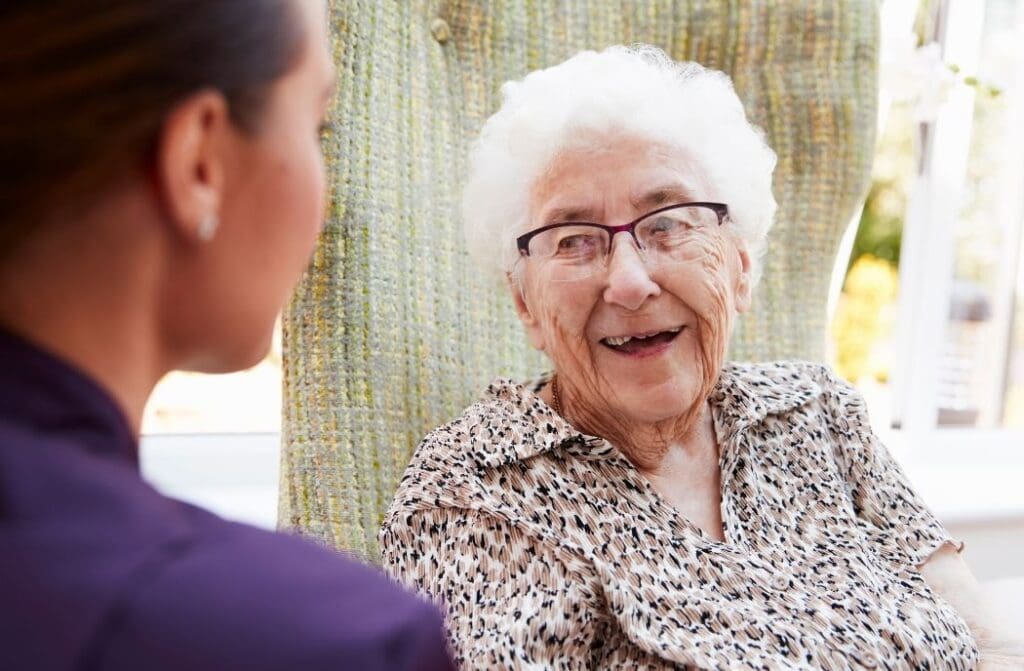If you’re the sole carer of an ageing parent, then you’ll know that many challenges come with it.
Do you have no time for yourself due to caring for your parent? Are you concerned about your parent’s health, suspecting they require more specialised care?
Your mother or father may refuse outside help, but if they have health issues, they must have the proper support for their well-being and safety. Your own well-being has also got to be a priority.
So, discover tips on how to deal with ageing parents and what elderly care, such as live-in care, is available.
Identifying the Signs of Ageing Parents

So, how can you know that your parent needs extra support? Below are some signs that may indicate your loved one requires additional care.
Decline in mobility
Individuals may experience difficulty walking, instability, or a higher frequency of falls, indicating a potential decline in physical mobility and coordination.
Chronic health conditions
Existing medical conditions may worsen, leading to increased health challenges and potential complications that require attention and management.
Changes in weight
Unexplained weight loss or gain could indicate underlying health issues, emphasising the importance of monitoring and addressing any significant fluctuations.
Forgetfulness
Memory lapses or forgetfulness that interfere with daily activities and responsibilities may suggest cognitive changes or the onset of conditions affecting memory and cognition.
Confusion
Difficulty understanding, following conversations, or making decisions may signal cognitive impairment or other neurological issues requiring assessment and intervention.
Mood swings
Sudden mood changes or heightened irritability may be signs of emotional distress, mental health concerns, or neurological changes that warrant attention and support.
Social withdrawal
Loss of interest in social activities or an increased tendency to spend more time alone could indicate feelings of isolation, depression, or other mental health challenges that should be addressed.
Neglecting personal hygiene
Poor grooming, an unkempt appearance, or neglect of dental care may indicate a decline in self-care, possibly linked to physical or mental health issues that need to be addressed.
Neglected household chores
Evidence of difficulties in maintaining the home, such as unpaid bills or increased clutter, may suggest challenges in organisation, time management, or physical abilities that require assistance or intervention.
If several of the above signs sound familiar, then your parent is possibly at an age where they would benefit from extra support, such as live-in care.
We’ll detail more about live-in care later in this blog; now, let’s look at how you can effectively deal with your ageing parent.
Be Patient
Approach discussions about your parent’s health with a gentle and gradual demeanour.
Rather than addressing all concerns in one overwhelming conversation, consider spreading your discussions over several interactions, allowing your parents time to process information.
Patience is necessary as you tackle sensitive topics. You create a supportive environment that fosters open communication by breaking down concerns into manageable discussions.
This approach respects your parent’s autonomy and allows for a more collaborative and understanding dynamic.
Work Together

When dealing with ageing parents, maintaining open lines of communication is essential.
Avoid arguments or imposing ultimatums. Involve your mother or father in the decision-making process.
This collaborative approach ensures that their perspectives and preferences are considered, fostering a more cooperative and supportive atmosphere.
Additionally, acknowledging and validating their emotions is key to creating a safe space for discussions.
Embracing empathy and active listening allows you to connect deeper, strengthening the emotional bonds between you and your parents.
Practice Self Care
Caring for ageing parents is a demanding responsibility. Recognising that you cannot effectively care for your ageing parents without attending to your own well-being is vital.
Taking breaks and allowing yourself respite is necessary for maintaining your physical and mental health. Consider the option of a live-in carer when you need additional support, offering you the flexibility to recharge and address personal needs.
Whether you need short or long-term specialised support for your parent, respite care is ideal; you can take a holiday or focus on your work commitments in the knowledge that your loved one is in safe hands.
What else can you do as an unpaid carer?
Seeking advice, counselling, or joining a support group can provide valuable insights and a sense of community, reminding you that you are not alone in this journey.
Furthermore, incorporating self-care practices like meditation or taking invigorating walks can be rejuvenating, offering moments of solace and reflection.
Talk to Their Doctor

Maintain open and regular communication with your parent’s doctor.
By actively engaging with the healthcare professionals involved in your parent’s care, you create a collaborative environment where the doctor can guide suitable care options and interventions tailored to your parent’s specific needs.
When you have a deeper understanding of your parent’s medical situation, you can make more informed choices about the next steps to provide the best care and support for their wellbeing.
Common Age-Related Conditions and Diseases
Now that you know how to deal with your ageing parent, let’s look at some common age-related conditions that may necessitate more specialised care.
Arthritis
This is a common age-related condition characterised by inflammation of the joints, leading to pain, stiffness, and reduced mobility. Osteoarthritis and rheumatoid arthritis are among the most prevalent forms.
High blood pressure
A common condition in older adults, high blood pressure, if left untreated, can increase the risk of heart disease, stroke, and other cardiovascular issues.
Osteoporosis
This condition is characterised by losing bone density and strength, making bones more fragile and prone to fractures. It is more prevalent in older individuals, especially postmenopausal women.
Alzheimer’s disease
A progressive neurodegenerative disorder, Alzheimer’s disease primarily affects older adults. It leads to cognitive decline, memory loss, and behavioural changes, impacting the individual’s ability to perform daily activities.
Why you Might be Unable to Care for Your Ageing Parent’s Needs

As a caregiver for an ageing parent, there may come a point where providing the necessary care becomes increasingly challenging, primarily due to the worsening health conditions of the individual.
The evolving nature of their health needs might require expertise or assistance that exceeds your capabilities.
Additionally, the demands of modern life, such as juggling work responsibilities, family commitments, and attending to your care, can intensify the challenges.
In such situations, exploring alternative care options becomes imperative to ensure the continued well-being of your parent while also addressing your own limitations and maintaining a sustainable balance in your life.
Understanding the Role of Live-In Carers
A live-in carer delivers comprehensive care to individuals, offering a spectrum of support that ranges from companionship to specialised care for specific health conditions.
One of the primary objectives of a live-in carer is to assist individuals in maintaining a comfortable and familiar living environment within their own homes. This familiarity contributes significantly to the emotional well-being and sense of security of the person receiving care.
A live-in carer provides 24/7 support, ensuring that the individual’s needs are attended to at all times, especially in cases where complex care is required. This level of constant assistance is particularly beneficial for those dealing with health challenges that necessitate ongoing attention.
How Live-In Carers can Address Dementia, Alzheimer’s and More

Many people with dementia prefer to stay within familiar surroundings – a live-in carer enables that. The individual receives appropriate care while still being able to see their friends and family whenever they wish and living as independently as possible.
Below are other ways a live-in carer can support your ageing parent.
Assist with mobility aids
Help the individual safely use walking aids such as canes, walkers, or wheelchairs.
Provide physical assistance
Offer support while walking to prevent falls and ensure stability.
Medication management
Ensure that medications are taken as prescribed and on time.
Monitor health
Keep track of vital signs, symptoms, and changes in health conditions and report them to healthcare professionals.
Meal planning and preparation
Create nutritious meals that meet dietary requirements and encourage healthy eating habits.
Simplify communication
Use clear and simple language to facilitate understanding.
Emotional support
Offer a listening ear and emotional support during periods of mood swings.
Engage in activities
Encourage participation in enjoyable activities to boost mood.
Facilitate social interactions
Arrange visits from friends and family or help the individual participate in community activities.
Personal care assistance
Assist with bathing, grooming, and dental care.
Light housekeeping
Assist with household tasks such as cleaning, laundry, and organising.
Choosing the Right Live-In Carer
Opting for live-in care can be a transformative solution in ensuring parents receive appropriate and personalised care.
Whether the care needs are short-term or long-term, IP Live-in Care tailors its services to accommodate various requirements.
One distinctive feature of IP Live-in Care is its commitment to ensuring compatibility between the individual and their assigned carer.
This personalised matching process goes beyond mere caregiving, aiming to create a harmonious relationship that enhances the overall quality of life for the individual receiving care.
In essence, choosing IP Live-in Care involves selecting a service and establishing a supportive partnership that prioritises the well-being and contentment of the individual under their care.
Our carers at IP Live-in Care understand how challenging this time is for you and your loved one – we can offer you the right level of support to alleviate your caring duties and ensure your parent is comfortable. Contact us to arrange live-in care today.